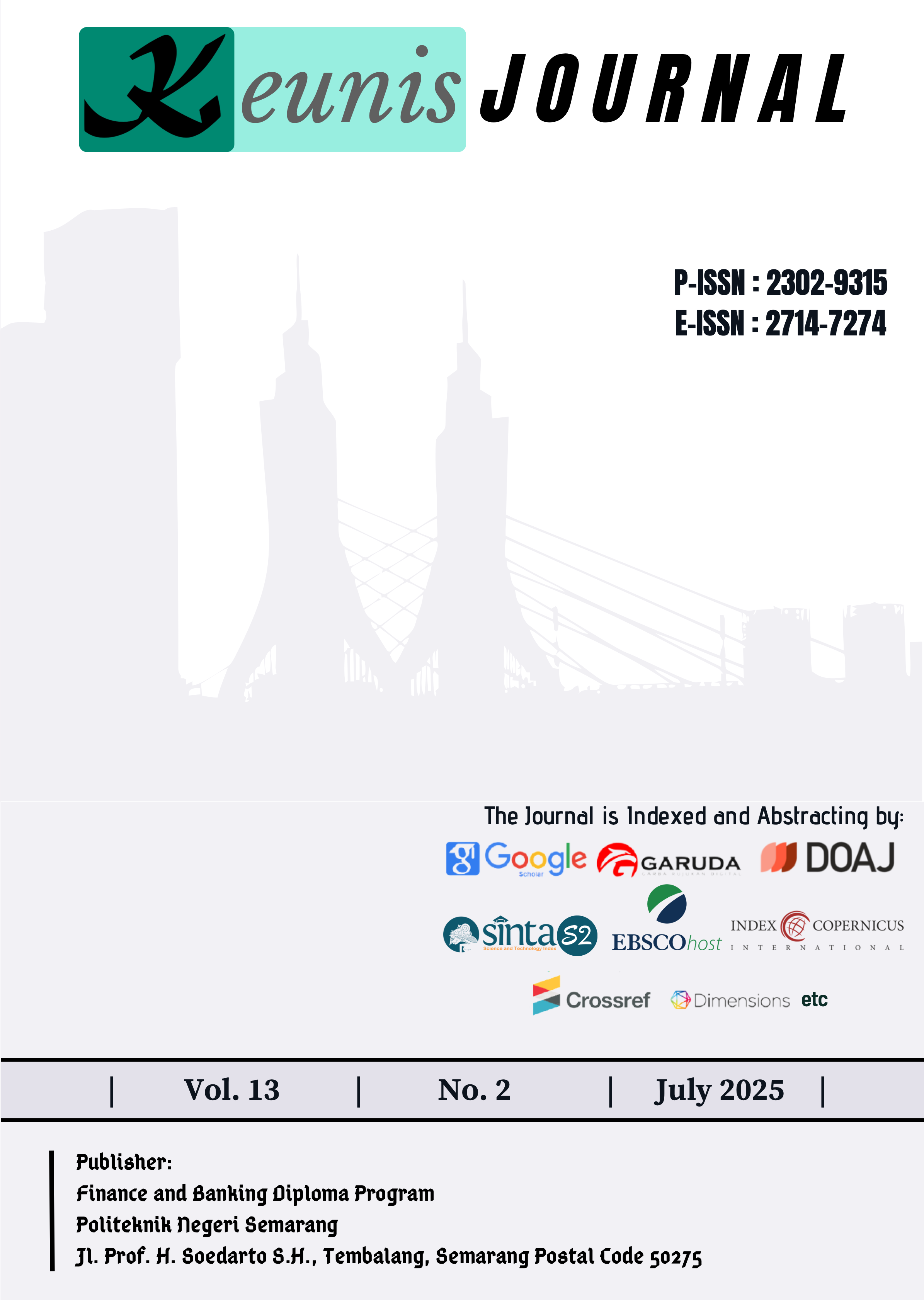Determinants of Environmental Quality Index (EQI) in Indonesia in 2018-2022
DOI:
https://doi.org/10.32497/keunis.v13i2.6559Keywords:
COVID-19, EQI, GRDP, HDI, Income, InvestmentAbstract
The environment is a critical issue in sustainable development in Indonesia, with significant variations in environmental quality between regions. This study seeks to examine the influence of the Regional Government Budget, COVID-19 (as a dummy variable), Gross Regional Domestic Product (GRDP), and the Human Development Index (HDI) on the Environmental Quality Index (EQI) in Indonesia. The data for this study were obtained from BPS–Statistics Indonesia and the Ministry of Environment and Forestry, covering the period from 2018 to 2022. The analysis employs multiple linear regression using panel data. Panel model testing indicates that the fixed effects model with cross-sectional lag provides the best fit. The results show that, collectively, all variables have a significant influence on Indonesia's Environmental Quality Index (EQI). Individually, the Regional Government Budget for environmental purposes, the COVID-19 dummy variable, and the Human Development Index (HDI) have a significant positive impact on EQI. In contrast, Gross Regional Domestic Product (GRDP) has a significant negative effect. These findings highlight the need for comprehensive macro-socioeconomic policies to sustain and enhance environmental quality in Indonesia.
References
Ahmad, H., Yaqub, M., & Lee, S. H. (2023). Environmental-, social-, and governance-related factors for business investment and sustainability: a scientometric review of global trends. In Environment Development and Sustainability (Vol. 26, Issue 2, pp. 2965–2987). Springer Science+Business Media. https://doi.org/10.1007/s10668-023-02921-x
Annisa, A., Ramadhan, A., & Suardi, A. (2022). Pengaruh Partisipasi Anggaran Dan Akuntansi Pertanggungjawaban Terhadap Kinerja Pegawai Kantor Bpkad Kota Palopo. Keunis Journal, 10(1), 13. https://doi.org/10.32497/keunis.v10i1.3118
Baltagi, B. H. (2005). Econometric Analysis of Panel Data (Third). John Wiley & Sons Ltd.
Banzhaf, E., de la Barrera, F., Kindler, A., Reyes‐Paecke, S., Schlink, U., Welz, J., & Kabisch, S. (2014). A conceptual framework for integrated analysis of environmental quality and quality of life. Ecological Indicators, 45, 664–668. https://doi.org/10.1016/j.ecolind.2014.06.002
Boukhatem, J., & Moussa, F. Ben. (2017). The effect of Islamic banks on GDP growth: Some evidence from selected MENA countries. Borsa Istanbul Review, 18(3), 231–247. https://doi.org/10.1016/j.bir.2017.11.004
Costantini, V., & Monni, S. (2007). Environment, human development and economic growth. Ecological Economics, 64(4), 867–880. https://doi.org/10.1016/j.ecolecon.2007.05.011
Dsouza, S., Krishnamoorthy, K., Kayani, U. N., Nawaz, F., & Hasan, F. (2024). Sustainable investing: ESG effectiveness and market value in OECD regions. Cogent Economics & Finance, 13(1). https://doi.org/10.1080/23322039.2024.2445147
Esty, D. C., & Porter, M. E. (2005). National environmental performance: an empirical analysis of policy results and determinants. Environment and Development Economics, 10(4), 391–434. https://doi.org/10.1017/s1355770x05002275
Greene, W. H. (2020). Econometric Analysis. Pearson.
Gujarati, D. (2004). Basic Econometrics BY Gujarati (pp. 1–1002). McGraw-Hill Inc.
Kementrian Lingkungan Hidup dan Kehutanan. (2022). SLHI_2022_upload_final_77f9948571. In Laporan Status Lingkungan Hidup Indonesia 2022 olh Kementrian Lingkungan Hidup dan Kehutanan Republik Indonesia.
Khan, T. (2024). Circular‐ESG Model for Regenerative Transition. https://doi.org/10.20944/preprints202407.1357.v1
Khomariyah, R. N., Setyowati, E., & Utomo, Y. P. (2022). Analysis of the Effect of Inflation, Interest Rate, Exchange Rate, and National Income on Financial Deepening in Indonesia From 2000 to 2020. Advances in Economics, Business and Management Research/Advances in Economics, Business and Management Research. https://doi.org/10.2991/aebmr.k.220602.020
Kuncara, T., & Anugrah, K. P. (2023). Analisis Volatilitas Cryptocurrency Pada Sebelum Pandemi Dan Pada Saat Pandemi Covid 19 Dengan Metode Return Pada Bitcoin Dan Ethereum. Keunis, 11(1), 86. https://doi.org/10.32497/keunis.v11i1.3981
Listyaningrum, N., Dewanti, T., Wahyudi, T. P., Josiana, G. R., Latifah, L., Ariefin, R. F., & Suprayogi, S. (2022). Study of the Environmental Quality Index in an Urban Campus Area. IOP Conference Series Earth and Environmental Science, 1039(1), 12065. https://doi.org/10.1088/1755-1315/1039/1/012065
Nawaz, S., & Iqbal, N. (2020). How cash transfers program affects environmental poverty among ultra-poor? Insights from the BISP in Pakistan. Energy Policy, 148, 111978. https://doi.org/10.1016/j.enpol.2020.111978
Praveena, S. M., & Aris, A. Z. (2021). The impacts of COVID-19 on the environmental sustainability: a perspective from the Southeast Asian region. Environmental Science and Pollution Research, 28(45), 63829–63836. https://doi.org/10.1007/s11356-020-11774-0
Pujiati, A., Yanto, H., Handayani, B. D., Ridzuan, A. R., Borhan, H., & Shaari, M. S. (2023). The detrimental effects of dirty energy, foreign investment, and corruption on environmental quality: New evidence from Indonesia. Frontiers in Environmental Science, 10. https://doi.org/10.3389/fenvs.2022.1074172
Rahmadhani, S. (2025). INNOVATION ’ S MEDIATING CONTRIBUTION TO THE RELATIONSHIP BETWEEN FINANCIAL FLEXIBILITY AND SUSTAINABILITY PERFORMANCE. Keunis Journal, 13(1), 30–43. https://jurnal.polines.ac.id/index.php/keunis/article/view/6111/109562
Schröter, B., Hack, J., Hüesker, F., Kuhlicke, C., & Albert, C. (2022). Beyond Demonstrators—tackling fundamental problems in amplifying nature-based solutions for the post-COVID-19 world. Npj Urban Sustainability, 2(1). https://doi.org/10.1038/s42949-022-00047-z
Singh, S., Ahirwar, A. K., Asia, P., Gopal, N., Kaim, K., & Ahirwar, P. (2021). COVID-19 and neurology perspective. Hormone Molecular Biology and Clinical Investigation, 42(1), 69–75. https://doi.org/10.1515/hmbci-2020-0069
Solheri, S., Azhar, M., & Yohandri, Y. (2022). Analysis of ethnoscience integrated environmental literacy for junior high school. JPBI (Jurnal Pendidikan Biologi Indonesia), 8(2), 178–188. https://doi.org/10.22219/jpbi.v8i2.17657
Statistik, B. P. (2022). STATISTIK LINGKUNGAN HIDUP INDONESIA 2022.
Sugiarto, A., Puspani, N. N., & Fathia, F. (2023). ESG Leverage towards Stock Performance in Indonesia Stock Exchange. International Journal of Energy Economics and Policy, 13(5), 593–606. https://doi.org/10.32479/ijeep.14384
Sugiyono. (2019). Metode Penelitian Kuantitatif, Kualitatif, dan R&D. Alphabet.
Suharti, L., & Sugiarto, A. (2020). A QUALITATIVE STUDY OF GREEN HRM PRACTICES AND THEIR BENEFITS IN THE ORGANIZATION: AN INDONESIAN COMPANY EXPERIENCE. Verslas Teorija Ir Praktika, 21(1), 200–211. https://doi.org/10.3846/btp.2020.11386
Suwandi, E. D. (2022). Efektivitas Insentif Pajak Dan Kebijakan Di Bidang Perpajakan Sehubungan Dengan Pandemi Covid-19. Keunis Journal, 10(1), 78–87. https://doi.org/10.32497/keunis.v10i1.3175
Syamsul, Nuelahlah, & Nurhadi. (2022). Krisis Pandemi Covid-19 Dampaknya Pada Pendapatan Daerah. Keunis Journal, 10(2), 1–10. https://doi.org/10.32497/keunis.10i2.3293
Tasri, E. S., Karimi, K., Muslim, I., & Dwianda, Y. (2022a). The influence of economic growth, energy consumption, poverty and population on Indonesia’s environmental quality index. KnE Social Sciences. https://doi.org/10.18502/kss.v7i6.10634
Tasri, E. S., Karimi, K., Muslim, I., & Dwianda, Y. (2022b). The influence of economic growth, energy consumption, poverty and population on Indonesia’s environmental quality index. KnE Social Sciences. https://doi.org/10.18502/kss.v7i6.10634
Trisnowati, Y., Achsani, N. A., Sembel, R., & Andati, T. (2022). The Effect of ESG Score, Financial Performance, and Macroeconomics on Stock Returns during the Pandemic Era in Indonesia. International Journal of Energy Economics and Policy, 12(4), 166–172. https://doi.org/10.32479/ijeep.13212
Wafiq, A. N., & Suryanto, S. (2021). The Impact of Population Density and Economic Growth on Environmental Quality: Study in Indonesia. Jurnal Ekonomi & Studi Pembangunan, 22(2), 301–312. https://doi.org/10.18196/jesp.v22i2.10533
Walpole, R. E. (2012). Probability & Statistics for Engineers & Scientists. Pearson.
Wu, Y., Wan, J., & Yu, W. (2023). Impact of environmental education on environmental quality under the background of low-carbon economy. Frontiers in Public Health, 11. https://doi.org/10.3389/fpubh.2023.1128791
Ye, L., & Fang, Z. (2025). The Impact of New-Quality Productivity on Environmental Pollution: Empirical Evidence from China. Sustainability, 17(7), 3230. https://doi.org/10.3390/su17073230
Downloads
Published
How to Cite
Issue
Section
License
Copyright (c) 2025 The Author(s)

This work is licensed under a Creative Commons Attribution-NonCommercial-ShareAlike 4.0 International License.
KEUNIS is licensed under a Creative Commons Attribution-ShareAlike 4.0 International License.
Authors who publish with this journal agree to the following terms:
- Authors retain copyright and grant the journal right of first publication with the work simultaneously licensed under a Creative Commons Attribution-ShareAlike 4.0 International License that allows others to share the work with an acknowledgement of the work's authorship and initial publication in this journal.
- Authors are able to enter into separate, additional contractual arrangements for the non-exclusive distribution of the journal's published version of the work (e.g., post it to an institutional repository or publish it in a book), with an acknowledgement of its initial publication in this journal.
- Authors are permitted and encouraged to post their work online (e.g., in institutional repositories or on their website) prior to and during the submission process, as it can lead to productive exchanges, as well as earlier and greater citation of published work (See The Effect of Open Access).






